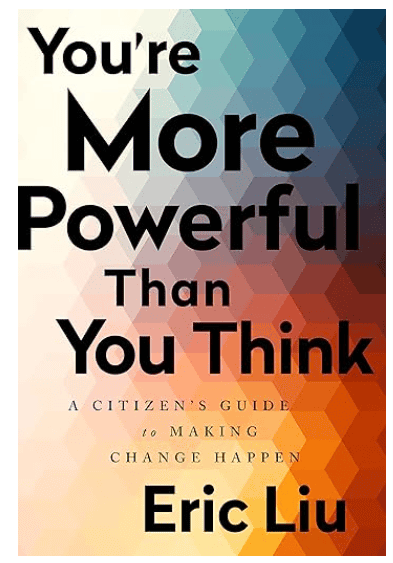By Jim Heffernan
I have to wonder why it took me so long to find this book. I might still be looking for the message in this book if friends hadn’t recommended it to me last week.
I’ve finally realized that what I’ve really been searching for with my binge reading is power for me and people like me. It’s fine to learn about politics and history and to ponder morality, but without power, we’re helpless passengers on spaceship earth.
Eric Liu was born in 1968 in upstate New York to Chinese immigrant parents. He was raised in a non-Chinese environment and without any particular religion. He was educated at Yale and worked in the Clinton and Obama administrations is the author of 8 books. He is CEO and founder of Civic University, an organization dedicated to propagating power to citizens who are normally shut-out from the power they need to further the prospects of themselves and their children.
“You’re More Powerful Than You Think” is his sixth book and lays out his ideas for “civic religion”. He lays out basic principles and illustrates them with stories about how people have used them to affect change in society. I found it a very enjoyable and inspiring read.
Here are excerpts from the book.
- First, power concentrates. That is, it feeds on itself and compounds (as does powerlessness). • Second, power justifies itself. People invent stories to legitimize the power they have (or lack). • Third, power is infinite. There is no inherent limit on the amount of power people can create.” (Page 25)
“If you don’t learn how to practice power, someone else will do it for you—in your name, on your turf, with your voice, and often against your interests.” (Page 10)
“As a result of this creeping public fatalism, we now have depressingly low levels of civic participation, knowledge, engagement, and awareness. Political life has been subcontracted out to a band of professionals—money people, message people, outreach people. The rest of us are made to feel like amateurs, as in suckers. We become demotivated to learn more about how things work. And this pervasive power illiteracy becomes, in a vicious cycle, both a cause and a consequence of the concentration of opportunity, wealth, and clout in society.” (Page 9)
“We haven’t truly enabled all the people of this society to participate in self-government to the fullest extent of their potential. We haven’t come close, not in an age when our elected officials and their staffs are overwhelmingly white, male, and affluent. Nor have we truly enabled all the people of this society to participate fully in economic life as creators and contributors. Not when 48 percent of the new jobs in the country are low-wage jobs paying less than $15 an hour, and when tens of millions rely on government payments for subsistence. And we haven’t truly enabled the citizens of this country to be as powerful as possible. Not when voter turnout is rarely above 60 percent (at best) and when poor, nonwhite, or immigrant voters are still being disenfranchised.” (Page 62)
Change the game, change the story, change the equation. Any of us can apply this framework to any situation in our own community or field. And each of these three imperatives can in turn be unpacked to yield three strategies.
Here’s how they break down.
Change the game:
- Adjust the arena.
- Re-rig the rules
- Attack the plan.
Change the story:
- Describe the alternative
- Organize in narratives.
- Make your fight a fable.
Change the equation:
-
- Act exponentially.
- Act reciprocally.
- Perform your power
Together, these nine strategies form an action plan for civic change-makers. You’ll realize, as we dive into each one, that Martin Luther King Jr. and Dolores Huerta and Harvey Milk and Gloria Steinem and Ronald Reagan and Ralph Reed executed all of them. You might notice Donald Trump did, too. Power is purpose-agnostic. Which is why those who become fluent in power must not be. So in the final part of the book, we will be asking the question-“to what moral ends?”-(Page 74)
Available Cloud and Leaf Bookstore, Manzanita 257 pages, Published March 28, 2017
As always, discussion is welcome at codger817@gmail.com. Feel free to share with others.


